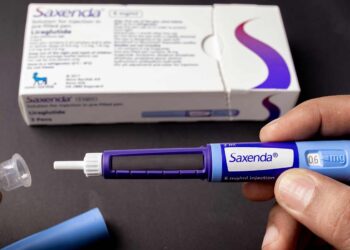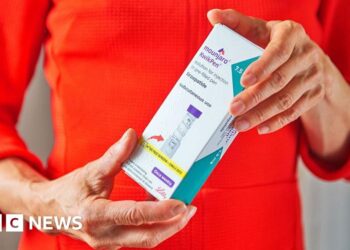TOPLINE:
In patients with type 2 diabetes (T2D) of less than 10 years’ duration who were taking metformin monotherapy, ECG abnormalities — including evidence of cardiovascular autonomic neuropathy — were common and associated with cardiovascular risk factors. After adding one of four frequently used glucose-lowering agents to metformin, fewer major ECG changes occurred with liraglutide than with the other treatments.
METHODOLOGY:
- Researchers aimed to examine ECG abnormalities and cardiovascular autonomic neuropathy across the different glucose-lowering treatment groups in 5029 participants (mean age, 57.2 years; diabetes duration, 4.2 years; A1c level, 7.5%; 36.4% women) from the GRADE trial.
- The participants had T2D for less than 10 years and were initially taking metformin monotherapy before being randomly assigned to receive metformin plus one of four commonly used glucose-lowering agents (insulin glargine, glimepiride, liraglutide, or sitagliptin).
- Patients were followed up for an average of 5 years.
- Resting ECGs were recorded at baseline and at 2‐ and 4‐year follow-ups and analyzed for overall, major, and minor abnormalities, as well as heart rate variability — a measure of cardiovascular autonomic neuropathy.
TAKEAWAY:
- More than half of participants in the GRADE trial had ECG abnormalities (57.1%) and ECG-defined cardiovascular autonomic neuropathy (52.8%) at baseline. The presence of these abnormalities was associated with longer diabetes duration, higher systolic blood pressure, greater prevalence of hyperlipidemia, more frequent use of lipid-lowering treatment, and beta-blocker use.
- Major ECG abnormalities occurred less frequently in the liraglutide group than in the other treatment groups (9% vs 13% at 4 years).
- Researchers found no significant differences in ECG-defined cardiovascular autonomic neuropathy between the liraglutide and non-liraglutide groups at 2 and 4 years (P = .42).
IN PRACTICE:
“ECG abnormalities, including those of CAN [cardiovascular autonomic neuropathy], are common in T2D < 10 years and are associated with certain CV [cardiovascular] risk factors. The development of major ECG abnormalities may differ by glucose-lowering treatment, as fewer occurred with liraglutide vs the other treatments," the authors concluded.
SOURCE:
The study was led by Rodica Pop-Busui, MD, PhD, Oregon Health & Science University in Portland. The results were presented on June 20 at the American Diabetes Association (ADA) 85th Scientific Sessions held June 20-23 at the McCormick Place Convention Center in Chicago, Illinois.
LIMITATIONS:
This abstract did not discuss any limitations.
DISCLOSURES:
Some authors disclosed receiving research support, consulting fees; serving on boards, advisory panels; being stock/shareholders; or other relationships with pharmaceutical and diagnostics companies and institutions.
This article was created using several editorial tools, including AI, as part of the process. Human editors reviewed this content before publication.
Source link : https://www.medscape.com/viewarticle/fewer-ecg-abnormalities-early-t2d-combo-therapy-2025a1000glu?src=rss
Author :
Publish date : 2025-06-22 18:10:00
Copyright for syndicated content belongs to the linked Source.














